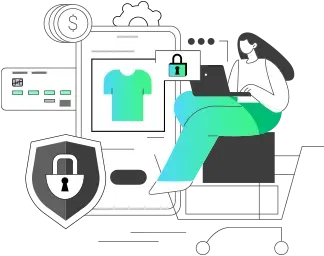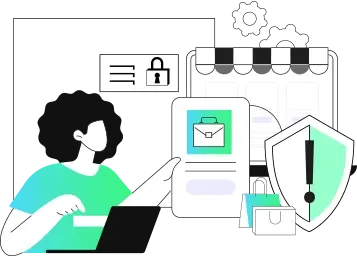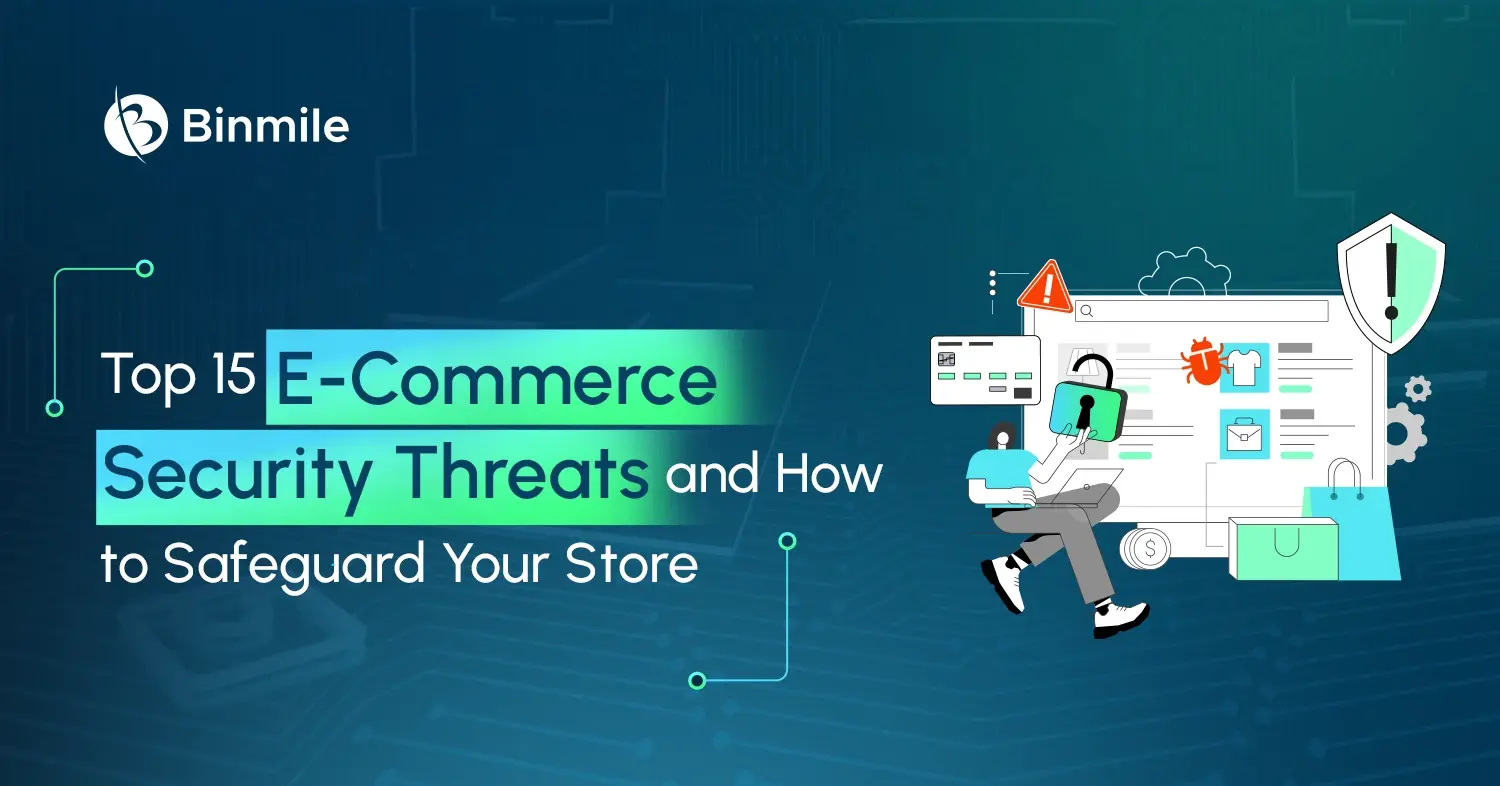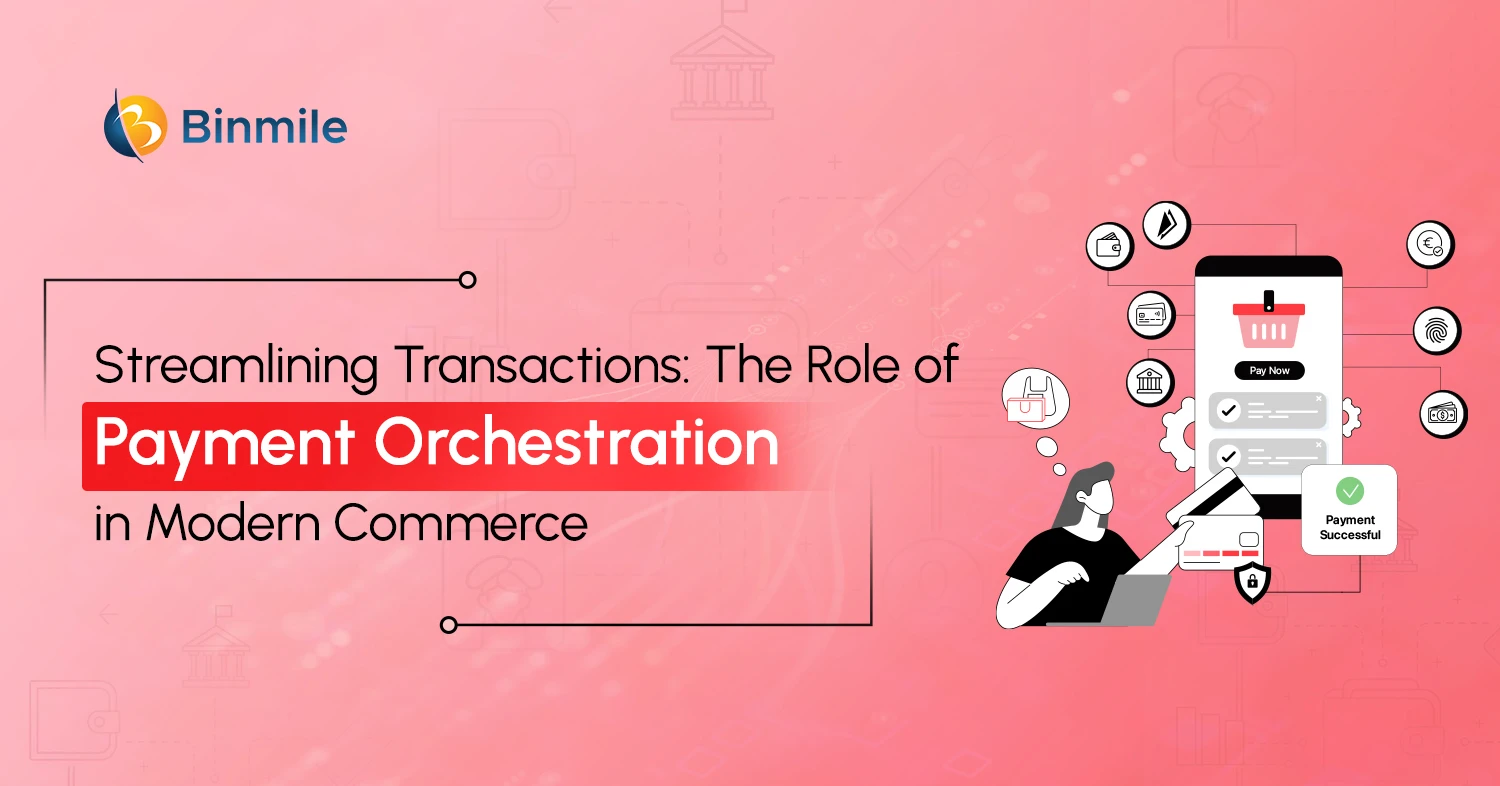E-commerce businesses face an ever-growing range of security threats that can have detrimental effects on their operations, revenue, and customer trust in the increasingly competitive digital marketplace. The rapid growth of online shopping has also opened new opportunities for cybercriminals to exploit vulnerabilities and launch sophisticated attacks. In fact, global e-commerce losses to online payment fraud went from $48 billion in 2023 to $206 billion globally by 2025. This is the damage done by just one type of e-commerce security threat.
Therefore, to mitigate these risks, businesses must understand the top e-commerce security threats they face and be aware of effective protection strategies recommended by IT security experts. In this blog, we will explore the top security threats in e-commerce that businesses face and discuss the five key security hacks suggested by our e-commerce security specialists. By understanding these threats and implementing the recommended measures, companies can strengthen their defenses and protect both their customers’ sensitive information and their own reputation.
What is e-Commerce Security?
E-commerce security encompasses a set of guidelines, measures, and policies designed to ensure the safety and security of online transactions. In today’s increasingly vulnerable, data-driven business world, it is crucial to safeguard sensitive business data from falling into the wrong hands. When a security breach occurs in e-commerce, a company faces public humiliation for being unable to protect its data, let alone withstand declining trust from its own customers. That’s why e-Commerce companies are leaving no stone unturned in reinforcing their security, including teaming up with e-commerce development companies.
Why Does E-Commerce Security Matter?
- Data Security: Keeps sensitive and confidential business data safe from unauthorized access.
- Improved Resiliency: Reduces the impact of cyberattacks and enhances recovery with minimal losses.
- Seamless Shopping Experience: Keeps your website safe and operational 24×7 for a smooth shopping experience.
- Improved Customer Trust: Makes your brand trustworthy, as customers feel safe shopping on your website.
Protect Your Online Store: Key E-commerce Security Risks to Know
E-commerce security threats come in various types and have different impacts on your online store or website. Let’s understand the different kinds of threats and how they can be mitigated.
1. Malware & Ransomware
Malware is malicious software used by hackers to exploit, disrupt, damage, or gain unauthorized access to your E-commerce website. Ransomware is a type of malware that locks you out of your critical systems until you pay the hacker to neutralize the threat. For e-commerce, ransomware can freeze checkout systems, halt inventory updates, and even compromise customer payment data. Many attacks spread through phishing emails, infected plugins, or compromised downloads.
Since hackers often target small and mid-sized e-commerce businesses, which are typically assumed to have weaker defenses, keeping endpoints secure and software up to date is crucial for minimizing risks and ensuring uninterrupted business operations.
2. Phishing & Social Engineering
Phishing attacks deceive employees or customers into sharing sensitive information, such as credentials, card details, or authentication codes, by posing as trusted sources, often via fake emails, SMS messages, or phone calls. For e-commerce businesses, phishing is frequently targeted at administrators or payment teams, resulting in unauthorized access or financial fraud. Social engineering goes beyond email, manipulating human behavior to bypass security protocols.
What is troubling about these attacks is that they exploit trust rather than technology or e-commerce architecture. Training teams to recognize red flags, verifying sender authenticity, and using email authentication protocols are essential to reducing the risk of falling victim.
3. Cross-Site Scripting (XSS)
XSS attacks occur when malicious scripts are injected into legitimate web pages, usually through input fields or comment sections. However, this type of cyberattack doesn’t impact your entire website, but rather exposes customer data on that specific page to malware and phishing. How does it work? When customers visit the compromised page, their session cookies, personal data, or payment information can be stolen without their knowledge or consent. E-commerce websites are especially vulnerable during checkout or login flows where data exchange is frequent.
Poor input validation, outdated frameworks, or insecure form handling make sites an easy target. Regularly sanitizing inputs, adopting content security policies, and running vulnerability scans are critical to mitigating XSS risks and protecting customer trust.
4. SQL Injection
SQL Injection exploits unprotected database queries by inserting malicious code through user input fields, such as search bars or login forms. Once successful, attackers can access, modify, or delete sensitive data, including customer records, payment details, and order histories. In e-commerce, compromised SQL servers frequently result in large-scale data breaches and compliance violations.
This security issue of e-commerce remains one of the most persistent threats because many older systems and plugins don’t enforce strict input validation. Using prepared statements, parameterized queries, and frequent code audits are effective ways to block these attacks at the database level.
5. Brute-Force Attacks
This type of cyberattack involves hackers repeatedly using several passwords or passphrases to guess the correct password. Hackers use automated scripts to generate passwords by combining letters, numbers, and characters until the correct password is found. E-commerce admin dashboards, payment gateways, and customer accounts are frequent targets. Once attackers gain access, they can steal sensitive information, manipulate inventory, or redirect funds, and weak passwords and a lack of account lockout policies make systems highly vulnerable.
Enforcing strong password policies, multi-factor authentication (MFA), and login attempt restrictions can significantly reduce risks, ensuring attackers face multiple layers of protection instead of exploiting a single weak credential.
6. DDoS & DoS Attacks
Denial of Service (DOS) and Distributed Denial of Service (DDoS) attacks can render your e-commerce website unstable by overwhelming it with excessive requests, thereby disrupting its operations. It mostly occurs during peak times, like Black Friday. One of the signs of DOS attacks is degraded network performance. Besides, you also see a high volume of email spam or website downtime. Some hackers even use DDoS attacks as a smokescreen while injecting malware or stealing data.
Investing in content delivery networks (CDNs), rate-limiting tools, and DDoS mitigation services helps ensure uptime and reduces financial losses from downtime during critical business periods.
7. Bots & Automated Attacks
One of the most significant cybersecurity threats, bots are programmed to perform tasks automatically, such as hacking confidential data, engaging in fraudulent activities, or scraping prices. What makes them malicious is that they can cause significant disruptions to e-commerce operations. Attackers deploy bots to scrape pricing, hoard inventory, fake sign-ups, perform credential stuffing, or place fraudulent orders. Bots distort analytics, inflate server costs, and disrupt user experience, resulting in customer frustration and lost revenue. Without proper bot management, e-commerce sites become playgrounds for automation-driven fraud.
Deploying advanced bot detection tools, CAPTCHA verification, and behavioral monitoring can help distinguish between real users and harmful scripts, thereby maintaining accurate business performance metrics.
8. API Abuse
Modern e-commerce platforms rely heavily on APIs to connect payment gateways, CRMs, and third-party tools, but unsecured APIs expose massive vulnerabilities. Attackers exploit poorly configured or unprotected APIs to bypass authentication, access sensitive customer data, or manipulate orders. For a quick commerce business model, where speed and accuracy are paramount, API abuse can trigger substantial financial losses and operational disruptions.
Best practices include enforcing authentication tokens, using encryption, setting rate limits, and continuously monitoring API usage to flag abnormal patterns before attackers gain unauthorized control over critical workflows.
9. Magecart & Card Skimming
Magecart-style attacks inject malicious JavaScript code into checkout pages to capture customers’ credit card details in real-time. These scripts often go undetected for weeks, silently stealing sensitive payment data and leading to widespread fraud and chargebacks. Because many e-commerce platforms depend on third-party scripts, they’re vulnerable if even one plugin or integration is compromised.
Monitoring third-party scripts, restricting unauthorized injections, and implementing subresource integrity checks are effective strategies for blocking Magecart-based card skimming attacks and keeping customer data secure.
10. Account Takeover
Account Takeover (ATO) is a critical threat in zero-click commerce, where seamless transactions can mask malicious activity. Attackers exploit stolen credentials, session hijacking, or weak authentication to silently gain control of user accounts, often without triggering alerts. Subsequently, a compromised account can authorize purchases, access payment methods, and modify preferences without the user’s awareness.
The lack of friction makes ATO especially dangerous; therefore, to reduce risk, enforce multi-factor authentication, monitor for unusual behavior, rotate session tokens frequently, and use device-level security to detect silent intrusions before they escalate.
11. Man-in-the-Middle (MITM) Attacks
In MITM attacks, hackers intercept data transmitted between users and the e-commerce website, especially over unsecured or public Wi-Fi networks. This allows them to capture sensitive information, such as login credentials, payment details, or session tokens. Without SSL encryption or secure session handling, checkout processes and customer accounts become highly vulnerable to security threats.
Using HTTPS across all pages, integrating TLS encryption, and deploying endpoint protection tools are critical to preventing these silent but highly damaging intrusions and ensuring e-commerce checkout page optimization.
12. Insider Threats
Not all attacks originate from external actors; sometimes, the danger lies within. Disgruntled employees, careless contractors, or compromised partners with privileged access can intentionally or accidentally expose sensitive systems. Insider threats often bypass traditional security layers because they originate from trusted credentials.
Limiting access based on roles, auditing admin activity, and enforcing strict authentication protocols for internal users are key strategies to mitigate insider-driven security risks.
13. Third-Party Integration Vulnerabilities
Every third-party tool, payment processor, chatbot, analytics platform, and shipping service adds another point of potential failure. If an integrated tool contains unpatched vulnerabilities, attackers can exploit it to infiltrate your entire e-commerce ecosystem. Since integrations often bypass standard security filters, constant monitoring is essential.
Regularly reviewing third-party dependencies, removing unused tools, and applying updates promptly significantly reduces the attack surface and maintains the security of the supply chain.
14. Supply Chain Attacks
E-commerce platforms depend on numerous software libraries, plugins, and vendors to run efficiently. Hackers compromise upstream suppliers, injecting vulnerabilities into widely used tools or updates that impact thousands of businesses simultaneously. Since these attacks exploit trust rather than direct vulnerabilities, they’re difficult to detect until after damage has occurred.
Conducting vendor risk assessments, limiting external dependencies, and verifying code integrity before deployment can help mitigate the cascading risks associated with supply chain compromises.
15. Zero-Day Exploits
Zero-day exploits target newly discovered vulnerabilities before developers release patches to address them. E-commerce businesses relying on older frameworks or outdated plugins are especially at risk. Because these attacks exploit previously unknown vulnerabilities, traditional defenses such as antivirus software or firewalls may be ineffective.
Using advanced threat detection systems, applying security patches immediately upon release, and maintaining ongoing vulnerability monitoring help reduce exposure to zero-day attacks and protect customer data proactively.
Protect your shopping app from cyber threats to deliver a smooth user experience and prevent expensive setbacks.

Top 5 Tips to Strengthen Your eCommerce Website Security
Cybercriminals are constantly evolving their tactics, making e-commerce sites a prime target, while you develop a solid D2C e-commerce strategy, also focus on security in e-commerce. So, let’s share five proven tips to safeguard your online store, secure transactions, and ensure a seamless, worry-free shopping experience for your customers.
Step 1: Build a Multi-Layered Security Framework
Protect your store with a comprehensive security system that combines firewalls, bot detection, antivirus tools, and continuous monitoring into a single, integrated solution. If one control fails, another takes over, preventing breaches from spreading. This approach limits single points of failure and creates a stronger, more reliable defense against evolving threats.
Step 2: Keep Your Platform Updated and Patched
Attackers often exploit outdated systems because vulnerabilities are well-documented and widely known. Regularly update your platform, plugins, and third-party integrations to close those gaps before they’re used against you. Automating updates where possible saves time and ensures consistency. Staying current on patches is one of the simplest yet most effective ways to block threats and offer e-Commerce personalization without worrying about threats.
Step 3: Enforce HTTPS Across Your Entire Store
Enable SSL/TLS encryption across the entire site, not just checkout pages. This keeps customer data secure at every step, from browsing to payment. Full-site HTTPS prevents data interception, avoids “not secure” warnings, and boosts customer trust. It also strengthens your brand’s credibility and improves search visibility, giving you a competitive edge.
Step 4: Strengthen Authentication with MFA
Combine strong password policies with multi-factor authentication to block unauthorized access, even if credentials are compromised. For companies offering mobile app development services, MFA is essential to protect user data and ensure secure app experiences. Regularly update authentication rules to stay ahead of evolving threats and maintain a resilient security posture.
Step 5: Enable Recovery with Real-Time Alerts
Set up real-time monitoring and alerts to spot unusual activity as it happens. Maintain secure off-site backups to ensure your data remains safe, even in the event of an attack. A solid incident response plan ensures quick recovery, minimizing downtime and customer impact. The faster you detect and act, the lower the damage to mobile app development services for e-Commerce.
*Bonus Point
Educate Staff and Clients
Security starts with awareness; you may integrate all advanced and strong policies or anti-virus software to protect your e-commerce website development. However, it would be futile if your workforce or customers are not aware of or not trained in data protection, password hygiene, and access protocols, and revoke credentials immediately upon exit. Therefore, empowering both groups reduces vulnerabilities and strengthens your overall security in e-Commerce.
Protect your software or app from cyberattacks with expert-driven solutions designed to keep your business secure and operational.

Binmile’s E-commerce Security Advantage With Trusted E-commerce Security Solutions
With the advent of advanced technologies, cyber threats are becoming increasingly sophisticated and more challenging to prevent and mitigate. Undoubtedly, the value of security in e-commerce websites is crucial, enabling businesses to operate without encountering data breaches, financial losses, or other unwanted consequences due to cybersecurity threats. Having robust security measures in place is also essential to prevent damage to an e-commerce brand’s online reputation after a data breach.
Under such circumstances, online retailers must proactively implement security measures to handle any potential cyber threats effectively. When you hire our e-Commerce developers, you get solutions that are designed with robust security in mind, enabling you to integrate with other essential systems in your e-commerce tech stack while safely and securely transferring data. We have been serving enterprise e-commerce platforms with futuristic software solutions meant to transcend their growth and profitability.
Schedule your call with our expert to build a robust e-commerce security solution that will help you operate your business unhindered by any security threats.
Frequently Asked Questions
Security breaches significantly impact e-commerce businesses by disrupting operations, damaging reputation, and incurring financial losses. Hackers accessing sensitive customer data or payment information can lead to fines and compliance penalties. Trust erosion among customers results in reduced loyalty and declining revenue.
Key impacts include:
- Financial Losses: Fines, legal costs, and recovery expenses.
- Customer Trust Erosion: Loss of loyal customers and reduced new user acquisition.
- Operational Disruptions: Downtime and delayed service restoration.
- Reputational Damage: Negative publicity and long-term brand harm.
To prevent these risks, e-commerce businesses must prioritize robust security measures and proactive threat management.
You should continuously monitor and update your security measures. Conduct regular security audits, install updates promptly, and stay informed about the latest threats and solutions in cybersecurity.
eCommerce security hinges on three critical pillars that work together to protect your online store:
- Data Security: Safeguard customer information through encryption, secure storage, and regular data backups. This ensures that sensitive data is protected from breaches.
- Transaction Security: Implement secure payment gateways, PCI-DSS compliance, and two-factor authentication to secure financial transactions.
- Customer Trust: Build trust by displaying security badges, clear privacy policies, and maintaining transparency about data use. Trust is the foundation of a secure shopping experience.
Focusing on these pillars creates a robust, secure environment for your eCommerce business.
Strengthening your online store’s security is crucial for protecting both your business and your customers. Here are key steps you can take:
- Update Regularly: Keep your website’s software, plugins, and security patches up to date to close vulnerabilities.
- Use Strong Passwords: Implement strong password policies and consider using password managers to ensure robust access control.
- Enable HTTPS: Secure your site with SSL certificates to encrypt data exchanged between your store and customers.
- Monitor Activity: Regularly monitor your website for suspicious activities and employ firewalls and security plugins for real-time protection.
Common e-commerce security issues include:
-
SQL injection and cross-site scripting (XSS) vulnerabilities
-
Weak user authentication that allows account takeovers
-
Lack of SSL encryption, making data transmission unsafe
-
Unpatched software or plugins with known vulnerabilities
-
Inadequate server and database security measures
Shoppers face several online risks, including:
-
Phishing scams via fake online stores or emails
-
Credit card fraud from compromised payment systems
-
Fake reviews and counterfeit products that mislead buyers
-
Delivery and refund fraud during online transactions
-
Malicious mobile apps posing as trusted stores
Customers can avoid these threats by verifying website authenticity, using secure payment methods, and avoiding suspicious links or downloads.









